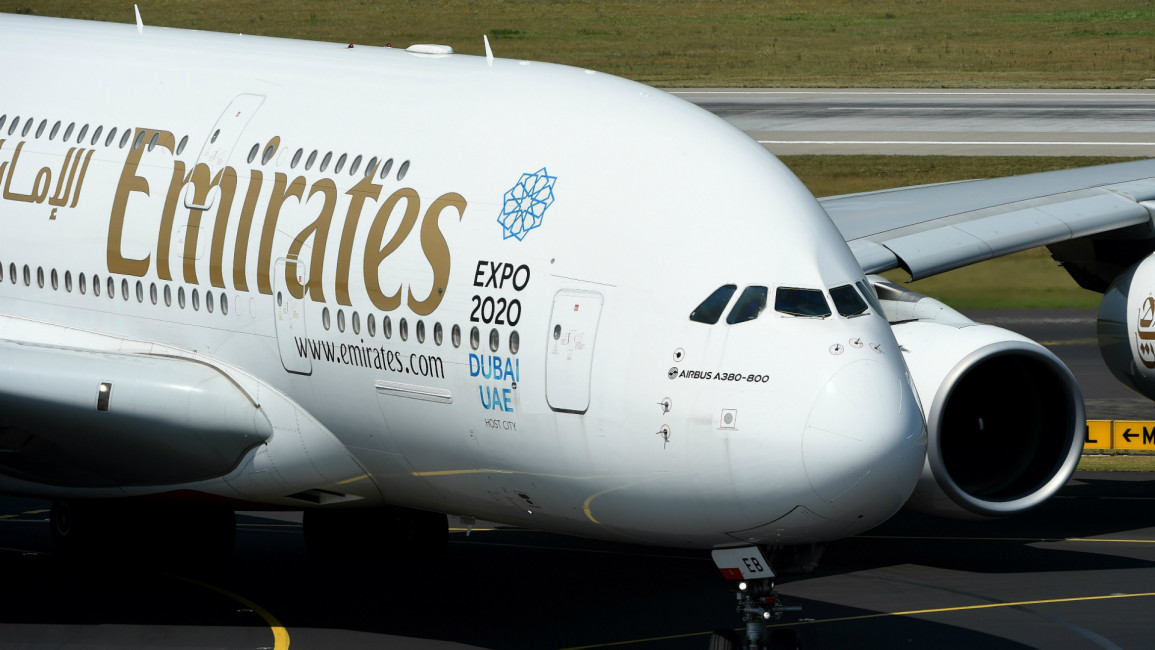Middle East airlines profits 'set to double' in 2018
Middle East airlines profits 'set to double' in 2018
Middle East airlines are set to see their profits double next year despite challenges including low oil revenues, regional conflicts and US travel restrictions.
2 min read
Middle East airlines are set to see their profits double next year [AFP]
Middle East airlines are expected to double their net profit to $600 million next year, the International Air Transport Association (IATA) said.
But big challenges still remain, the aviation body said, as demand grows by seven percent, outpacing announced capacity expansion of 4.9 percent.
"The region's carriers face challenges to their business models, from low oil revenues, regional conflict, crowded air space and the impact of travel restrictions to the US," IATA's chief economist Brian Pearce told Gulf News.
However, Turkey facing its own difficulties at home including political issues and terrorism has also hampered the market.But big challenges still remain, the aviation body said, as demand grows by seven percent, outpacing announced capacity expansion of 4.9 percent.
"The region's carriers face challenges to their business models, from low oil revenues, regional conflict, crowded air space and the impact of travel restrictions to the US," IATA's chief economist Brian Pearce told Gulf News.
"But despite the challenges, there is positive momentum heading into 2018," Peace added.
"Like Africa, the rise in fuel prices is starting to help with revenues and the local economies [in the region], which are expected to be stronger."
IATA's chief added that while 2017 was a bad year for the region's airlines as it was for the global industry, the Middle East airlines have now "entered into normal waters … after a fantastic double-digit growth of 20 years".
"They are now entering into a growth area which is more comparable to their peers. So they are facing the same type of issues such as restructuring the network, reshuffling destinations and so on. Now, it's normal business for them," he told Gulf News.
However he added another major challenge was the competition posed by Turkish Airlines, whose new "super connector" role threatened the position the Gulf airlines have enjoyed for so long.
"Turkish Airlines is a threat that the Middle East airlines should be worried about," Pearce said.
"Turkish Airlines has been performing a 'super connector' role with a different business model, using single-aisle aircraft. But it benefits from a lot of the geographical advantages, and it has grown dramatically in the last decade," he added.
"Like Africa, the rise in fuel prices is starting to help with revenues and the local economies [in the region], which are expected to be stronger."
IATA's chief added that while 2017 was a bad year for the region's airlines as it was for the global industry, the Middle East airlines have now "entered into normal waters … after a fantastic double-digit growth of 20 years".
"They are now entering into a growth area which is more comparable to their peers. So they are facing the same type of issues such as restructuring the network, reshuffling destinations and so on. Now, it's normal business for them," he told Gulf News.
However he added another major challenge was the competition posed by Turkish Airlines, whose new "super connector" role threatened the position the Gulf airlines have enjoyed for so long.
"Turkish Airlines is a threat that the Middle East airlines should be worried about," Pearce said.
"Turkish Airlines has been performing a 'super connector' role with a different business model, using single-aisle aircraft. But it benefits from a lot of the geographical advantages, and it has grown dramatically in the last decade," he added.
"So the weakness of home markets is one of the key challenges, and hopefully that's easing with the rise in fuel prices," Pearce said, adding that political instability and regional conflicts continue to affect inbound tourism in the Middle East. "It would be nice to see that diminish."
"The fall in fuel costs is adding tremendously to the airlines' profits," Pearce added.
The United States Supreme Court on Monday allowed the Trump administration to fully enforce a ban on travel to the US by residents of six Muslim-majority countries, the impact of which could affect passenger numbers and frequency of flights to the US.



